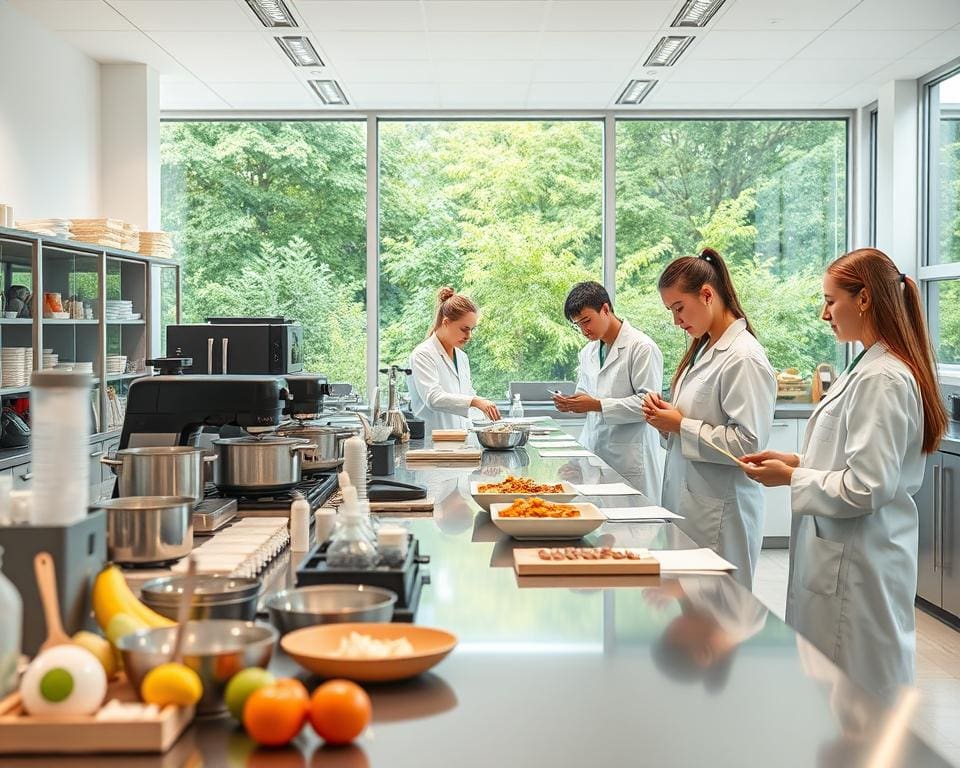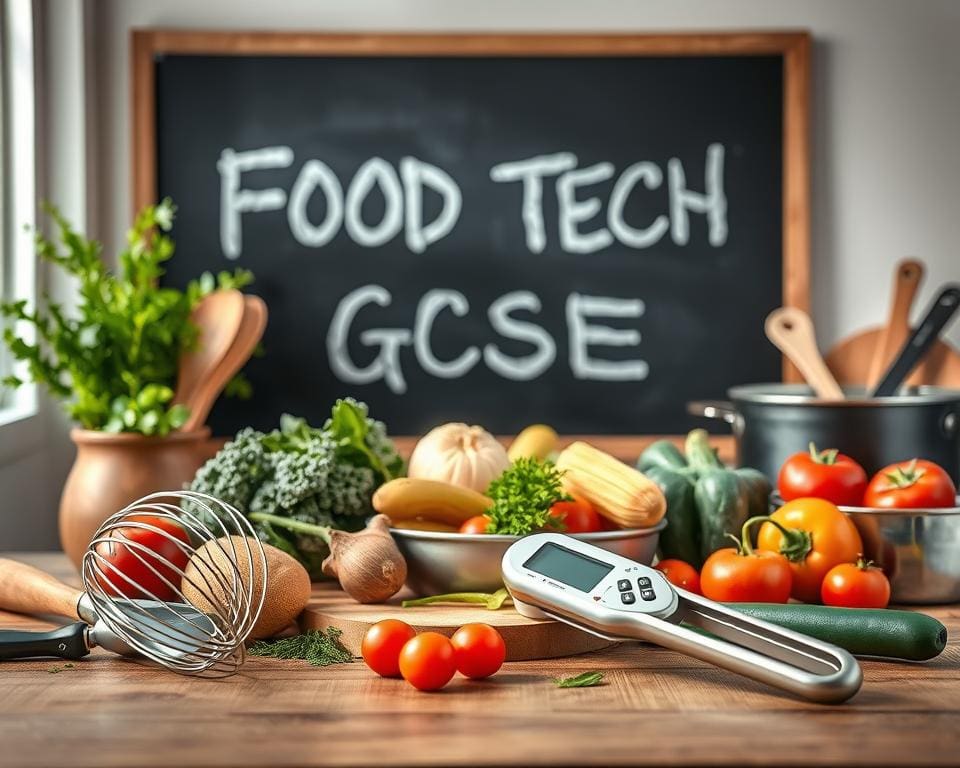GCSE Food Technology, often abbreviated as Food Tech, is an essential educational programme within the UK’s secondary school curriculum, tailored specifically for students aged 14 to 16. This course intricately weaves together theoretical aspects of food science with practical culinary skills, providing a comprehensive understanding of food and nutrition.
By exploring topics such as food safety, nutritional awareness, and culinary techniques, students are well-equipped to appreciate the significance of food technology in today’s society. Understanding what Food Tech GCSE entails not only enriches their educational journey but also opens doors to various career prospects in the food sector, making it a pivotal part of their academic development.
Understanding GCSE Food Technology
Studying GCSE Food Technology offers a range of invaluable skills and insights that pave the way for a deeper understanding of the food industry. Students benefit significantly from exposure to essential methodologies in cooking, nutrition, and food science. This rich learning experience not only cultivates practical skills but also fosters a lifelong appreciation for healthy eating.
Benefits of Studying Food Technology
The benefits of studying Food Technology extend beyond the classroom. Student engagement in this subject nurtures critical thinking, creativity, and problem-solving abilities. Pupils prepare for future academic pursuits or vocational training through hands-on experiences and informed decision-making regarding nutrition and food choices. Understanding food science contributes to developing essential food safety practices that everyone should adopt.
Core Topics Covered in the Curriculum
Students explore various core topics throughout their Food Technology course, ensuring a comprehensive education. Central subjects include:
- Food safety principles and regulations
- Nutritional information and dietary requirements
- Understanding different ingredients and their applications
- Meal planning and recipe development
- Sensory analysis and evaluation of food products
These core topics empower students with a well-rounded perspective on the food industry, equipping them with the necessary tools to make informed choices in their personal and professional lives.

What Is Food Tech Gcse
Food Technology encompasses a fascinating blend of science, creativity, and essential skills geared towards food processing, preservation, and production. Within the GCSE framework, students dive into a subject that not only enhances their culinary talents but also prepares them for broader academic journeys in fields such as nutrition, hospitality, and health.
Definition and Significance of Food Technology
Understanding Food Tech is crucial for appreciating its role in everyday life. At its core, Food Technology focuses on the methods and science behind food preparation and safety. The significance of Food Technology lies in its ability to cultivate skills that extend well beyond the kitchen.
By exploring the intricate relationship between food and science, students gain insights that foster healthier eating habits, food sustainability, and nutritional awareness. These skills are essential in today’s world, where informed choices about food can have a significant impact on health and well-being.
Exam Details
Understanding the GCSE exam structure for Food Technology is crucial for students aiming to excel in their assessments. This qualification features a comprehensive exam format incorporating both written assessments and practical evaluations. Students are expected to demonstrate theoretical knowledge alongside their practical skills in food preparation, creating a balanced and thorough assessment approach.
Format and Structure of the GCSE Exam
The GCSE exam is divided into distinct components to ensure a holistic evaluation of student competencies. Generally, the structure includes:
- Theory examinations that assess knowledge of food science, nutrition, and cooking methods.
- Practical assessments where students showcase their skills in preparing and presenting food.
- Project work that reflects their understanding of design, planning, and execution in food-related contexts.
Key Dates and Timelines for Students
Staying informed about key dates is essential for effective preparation. Important timelines include:
- Registration deadlines, which typically fall in early autumn.
- Exam dates, scheduled in the summer term, allowing ample time for revision.
- Announcement of results, usually occurring in mid-August, giving students the opportunity to assess their performance and plan future steps.
Syllabus Overview
The GCSE syllabus overview provides a comprehensive breakdown of the key components within the Food Technology programme. Students engage with major units that are designed to enhance their understanding of food production, design, and evaluation. Each unit offers a unique perspective, allowing for a diverse learning experience.
Major Units Within the Syllabus
Within the GCSE Food Technology syllabus, several major units are essential for building a solid foundation in food studies. The units typically include:
- Food Science
- Nutritional Science
- Food Preparation Skills
- Food Product Development
These units encourage students to explore various aspects of food technology, preparing them for both theoretical understanding and practical application.
Integrating Theory and Practical Skills
This syllabus emphasizes the importance of integrating theory with practical skills. Students delve into the science of cooking, gaining insights that enhance their culinary abilities. Learning through hands-on experiences, such as developing and testing recipes, helps to deepen their understanding of food processes and ingredient interactions. Engaging in practical skills not only complements the theoretical knowledge but also fosters creativity and critical thinking, essential attributes in any aspiring food technologist.
Assessment Criteria
Understanding the assessment criteria for GCSE Food Technology is essential for students aiming to achieve high marks. This subject evaluates learners through a blend of practical projects and written examinations. Each component holds specific weightage, directly influencing the overall student evaluation.
How Students Are Evaluated
Students are assessed on various competencies, including creativity in food preparation and an understanding of nutritional values. The evaluation process aims to provide a comprehensive overview of each student’s ability to apply food science concepts effectively. Engaging in practical activities allows students to showcase their skills in real-world contexts, emphasising their capabilities beyond theoretical knowledge.
Weightage of Practical vs. Theory Components
The balance between practical and theory is crucial in GCSE Food Technology. Generally, the assessment criteria assign a significant percentage to both components:
- Practical tasks account for about 60% of the total evaluation, highlighting the importance of hands-on experience.
- Written exams contribute approximately 40%, testing students’ theoretical understanding of the concepts.
This distribution encourages a holistic approach to learning. It ensures students not only grasp theoretical knowledge but also master the practical skills necessary to thrive in the culinary industry.
Coursework Requirements
The coursework component of the GCSE Food Technology programme plays a vital role in student assessment. This element provides an opportunity for learners to apply theoretical knowledge to practical contexts, enhancing their understanding and skills within the culinary arts.
Understanding the Coursework Component
Students must engage with diverse tasks that satisfy specific coursework requirements. Engaging in practical applications is crucial, as it allows learners to develop recipes, plan meals, and conduct food experiments. Each project encourages creativity, innovation, and the ability to cater to various dietary needs, which are essential for success in the field of food technology.
Examples of Past Projects
In exploring project examples, students may focus on concepts such as creating a healthy meal plan tailored to individual dietary restrictions or developing unique recipes that highlight seasonal ingredients. Past projects have also included designing packaging solutions that promote sustainability, reflecting current trends in the food industry. Such tasks not only demonstrate culinary skills but also foster critical thinking and problem-solving abilities.
Revision Tips for Success
Preparing for the GCSE Food Technology exam may appear daunting, yet with the right approach, students can navigate their studies confidently. Effective revision tips not only enhance understanding but also promote retention. A combination of various study techniques can turn the preparation phase into an engaging journey.
Effective Study Techniques and Tools
Employing effective study techniques can significantly improve your exam readiness. Consider utilising the following methods:
- Flashcards: Create flashcards for key terms and concepts. This method aids in memory retention through active recall.
- Study groups: Collaborate with peers to share insights and clarify doubts. Group discussions can spark deeper understanding.
- Online resources: Leverage educational websites and videos tailored to Food Technology. These platforms offer diverse explanations that can reinforce learning.
Managing Your Study Time
Time management is crucial for balancing study sessions with practical cooking activities. Here are some effective strategies:
- Set a schedule: Plan your study time well in advance. Allocate specific time slots to each topic, ensuring thorough coverage of the syllabus.
- Prioritise tasks: Focus on challenging subjects first. Completing difficult topics early can boost your confidence for the remainder.
- Break sessions into chunks: Use the Pomodoro technique, studying in focused bursts with short breaks in between. This method helps maintain concentration and prevents burnout.
Career Opportunities in Food Technology
Completing a GCSE in Food Technology opens a myriad of career opportunities within the rapidly evolving food industry. This qualification not only equips students with essential skills in culinary arts and nutrition but also lays a foundation for various roles in food science and food safety management. The versatility of this field means that graduates can find exciting career paths that match their interests and aspirations.
Students have the chance to pursue further academic qualifications, such as A-levels in related subjects, which can lead to advanced study in nutrition, food science, and hospitality management. Alternatively, vocational training programmes provide direct entry into the workforce, offering practical experience and essential industry insights. Many students choose to begin their careers as chefs, food technologists, or nutritionists, contributing positively to the food sector.
With an ever-increasing demand for innovation in food production and safety, the future prospects for those with a background in food technology are promising. As a response to growing consumer awareness and public health priorities, professionals in this field will play a crucial role in shaping sustainable food practices and enhancing the safety and quality of food products. Embracing a GCSE in Food Technology can pave the way to a rewarding career in a sector that is vital to society.









